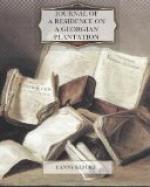I went again to-day to the Infirmary, and was happy to perceive that there really was an evident desire to conform to my instructions, and keep the place in a better condition than formerly. Among the sick I found a poor woman suffering dreadfully from the ear-ache. She had done nothing to alleviate her pain but apply some leaves, of what tree or plant I could not ascertain, and tie up her head in a variety of dirty cloths, till it was as large as her whole body. I removed all these, and found one side of her face and neck very much swollen, but so begrimed with filth that it was really no very agreeable task to examine it. The first process, of course, was washing, which, however, appeared to her so very unusual an operation, that I had to perform it for her myself. Sweet oil and laudanum, and raw cotton, being then applied to her ear and neck, she professed herself much relieved, but I believe in my heart that the warm water sponging had done her more good than anything else. I was sorry not to ascertain what leaves she had applied to her ear. These simple remedies resorted to by savages, and people as ignorant, are generally approved by experience, and sometimes condescendingly adopted by science. I remember once, when Mr. —— was suffering from a severe attack of inflammatory rheumatism, Doctor C—— desired him to bind round his knee the leaves of the tulip-tree—poplar, I believe you call it—saying that he had learnt that remedy from the negroes in Virginia, and found it a most effectual one. My next agreeable office in the Infirmary this morning was superintending the washing of two little babies, whose mothers were nursing them with quite as much ignorance as zeal. Having ordered a large tub of water, I desired Rose




